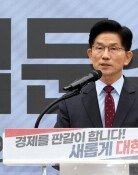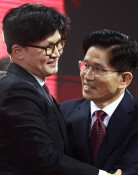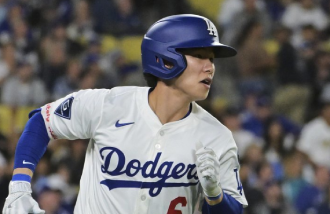[Editorial] High-ranking suspects ridicule prosecutors
[Editorial] High-ranking suspects ridicule prosecutors
Posted August. 06, 2000 20:50,
Prosecution authorities have summoned ex-United Liberal Democrats (ULD) lawmaker Kim Bum-Myong for allegedly receiving a huge kickback from a private firm he helped gain tax cuts for by lobbying the National Taxation Bureau. It turned out, however, that Kim had already escaped to China last month. Some time ago, Choi Man-Suk, the suspected principal lobbyist in a bribery case surrounding the country`s high-speed railway project ridiculed authorities` arrest efforts by easily escaping overseas. In addition, lawyer Park Byong-Il, who ran for the 16th general elections, also managed to flee to the United States the day before the Supreme Court found him guilty of fraud and extortion.
We do not think that the suspects` overseas escapes were the result of prosecutorial mistakes or faulty institutional arrangements to detain them. Fleeing abroad would have surely been impossible if they were ordinary suspects unable to pull powerful strings.
In particular, the prosecutors failed to arrest ex-lawmaker Kim because they hesitated to detain him for fear of unsavory political repercussions. The ex-lawmaker is the principal suspect in a bribery case in which the former director of the National Taxation Bureau, a bank governor and many politicians are implicated. For some incomprehensible reason, the prosecutors did not arrange a ban on foreign travel for Kim. In mid-July, they had already obtained enough evidence to ensure his conviction. Apparently, it was only after Kim defied their initial subpoena that prosecutors belatedly adopted measures to bar him from leaving the country.
The way Kim`s case was handled was exceptional. The prosecutors` usual practice has been to first ban suspects in major cases from travelling overseas before they proceed with investigations. A clear example was opposition Grand National Party ex-lawmaker Su Sang-Mok learning at the airport that he was already forbidden to travel abroad in 1998 in connection with the controversial "taxgate`` case. Apparently, some influential politicians made repeated phone calls to the prosecution authorities on Kim`s behalf. We are also familiar with stories that there has always been some conflict between lower-level investigating prosecutors and their superiors over cases with political implications.
Not long ago, a prosecutor openly complained about, and argued for a revision of, the regulations which require prosecutors to obtain prior permission from the Minister of Justice when they arrest high-level government officials. This means that the imperative task is to guarantee prosecutors` independence from political powers. Ex-lawmaker Kim`s case reinforces the necessity for this. By far the foremost consideration here is that both prosecutors and their high-ranking superiors must make every effort for self-reform and self-renewal as means to obtain their political independence.







